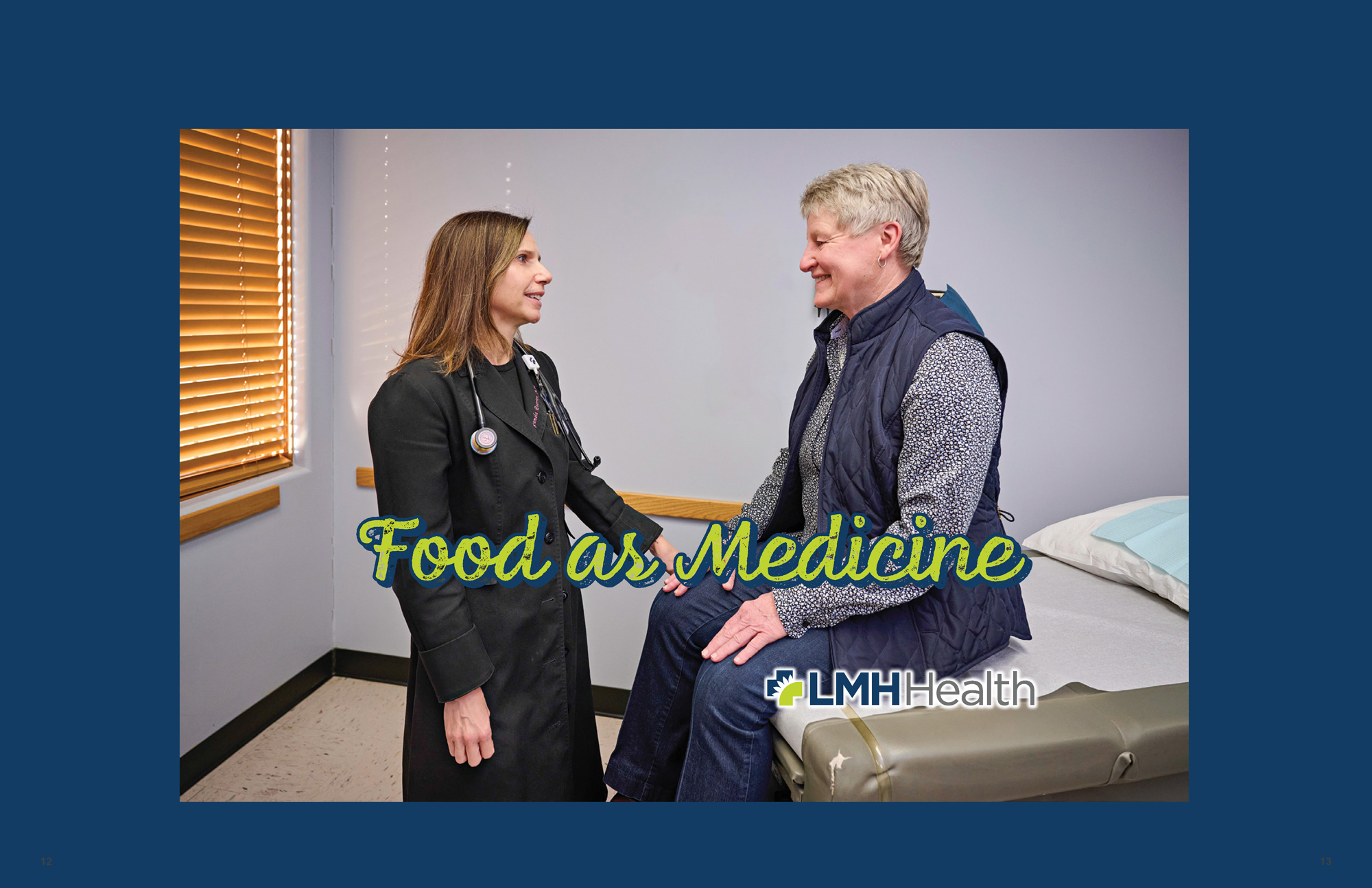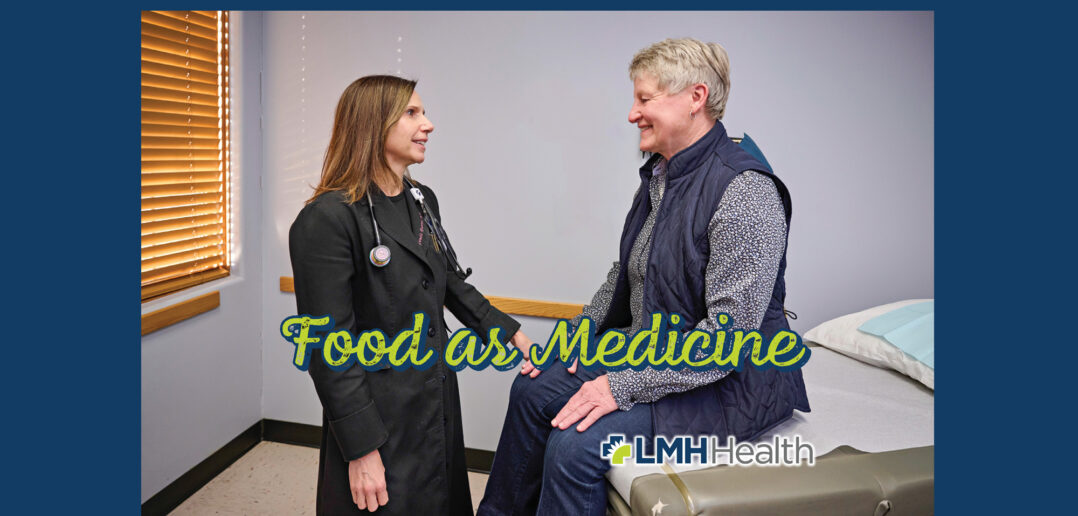| story by | |
| photo by | Steven Hertzog |
| OPEN A PDF OF THE ARTICLE |
LMH Health specialist explains how best to keep that extra weight off.

Dr. Pamela J. Huerter and patient
By Kade Han, LMH Health, Social Media and Digital Communications Specialist
Many people struggle with knowing how or where to start with their weight loss or fitness journey. Pamela J. Huerter, MD, a physician with LMH Health Free State Family Medicine who is certified in culinary medicine, provides insight.
Being certified in culinary medicine allows Huerter to help patients better understand the impact their diet can have on their health. It reinforces the concept of using food as medicine to manage and prevent disease.
“Currently, nutrition services aren’t well-covered by insurance, so being able to provide guidance as a physician offers a resource that may be better covered than other traditional dietary services,” she explains.
Can you lose weight with exercise alone?
Weight gain results from an overabundance of energy (calorie) dense foods. If you eat foods that break down into energy quickly, your body has to use it right away. If you can’t use the energy right away, your body stores it in fat cells. If that happens over and over, weight gain occurs.
Weight loss results from being in a calorie deficit, which occurs when your body burns more calories than you consume. So while exercise is a necessary tool for weight management, you cannot lose weight with exercise alone.
“If you aren’t exercising at all and you start, you may see weight loss due to the calorie deficit,” Huerter says.
It doesn’t matter if you’re wanting to lose or maintain your weight, exercise is a great way to connect with your body. The Centers for Disease Control and Prevention recommends adults get 150 minutes of exercise each week. You don’t have to do this all at one time. Break it up however works best for you.
“For a person who is just looking to maintain or lose a few pounds, 150 minutes a week is a good rule,” Huerter adds.
Should you eat salads if you are trying to lose weight?
LOCAL MATTERS
Our Local Advertisers – Making a Positive Impact
Salads can be a great way to increase your vegetable increase, but not all salads result in weight loss. Look at the individual ingredients that are in the salad, such as toppings and dressings. If you’re looking for food that is low in calories and nutritious, greens are a great place to start.
“What helps us manage how much we eat is how our stomach feels when it fills up,” Huerter says. “Fiber in food helps your stomach realize it’s full. Water also helps tell your body that it’s full, so filling your stomach with liquid can also help.”
When evaluating how much and what types of food you should eat, consider the energy density of the food and the amount you need. Not all foods have the same calorie amount per cup or tablespoon.
“When you think about food fueling you, it is really easy to consume more energy than you spend,” Huerter explains.
Understanding the difference between a portion and a serving size also helps you understand what an appropriate portion is. Get familiar with serving sizes to help you gauge how much food your body needs. Eating slowly can also help your body to recognize that it’s full.
Is cutting carbohydrates a good way to lose weight?
Carbohydrates are the body’s preferred source of energy. You should eat carbohydrates, but pay attention to the type of carbohydrate. It’s wise to select carbs that include fiber, such as whole grains, nuts, fruits and vegetables.
“Our bodies love whole foods. They engage the entire process slowly, giving your body more time to use the energy,” Huerter continues.
For weight loss or management, cutting back on processed foods can help. Processed foods are typically stripped of their fiber, making the energy in them much more easily accessible, which is partly why the consumption of a lot of processed food is associated with weight gain.
Does eating late at night result in weight gain?
Our bodies use and store calories based on movement and activity. When you sleep, your body slows down, and that results in your energy expenditure dropping. Huerter notes that if you eat late at night, the drop requires your body to store the excess calories.
Eating late can also affect the quality of your sleep. As your digestion slows, that late-night snack or meal can contribute to symptoms of acid reflux. As your body tries to digest the food, it may counteract the body’s natural circadian rhythm.
“Our food tends to be better digested during the day when we are upright,” Huerter states.
If you do choose to eat late at night, a good rule of thumb is to eat something small that includes fiber and protein. It is important to avoid spiking your blood sugar. Eating a complex carbohydrate, such as a fiber-rich fruit or vegetable, allows your body to slowly process the snack.
“If your blood sugar is high overnight when you’re inactive, there is less of an opportunity to use that extra energy, which means it will inadvertently be converted to stored energy such as fat,” Huerter explains.
In the End
Weight loss stems from a change in eating habits and energy deficit. Try to choose foods that are high in nutritional value and low in calories. Processed foods tend to be low in nutrition but dense in energy.
“At its baseline, weight loss results from being in an energy deficit (so) you can access your fat stores,” Huerter says.
When setting your weight-loss goals and diet, remember that depriving yourself of certain things doesn’t equate to weight loss. Simple carbohydrates and sugars are OK in moderation. Be mindful of what your body needs to fuel itself and what you consume.
If you have questions or concerns when making changes to your diet or exercise routine, consult your primary care physician. He or she will help you set health goals that align with your body’s best interests.




